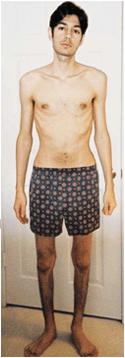 |
| At his sickest, Rubin weighed just 114 lbs. |
Ten years ago, at age 19, I was diagnosed with Crohn's Disease. In addition, I had everything from arthritis to diabetes to chronic fatigue to hair loss, anemia. I was a complete mess. In one seven-week period, I lost 20 pounds. This was after being a completely healthy 185-pound, college athlete on academic scholarship. I traveled the world trying every treatment you could think of, conventional medicine, alternative medicine. It all failed. I was in a wheelchair and was facing a very risky and life altering surgery.
How did you get back to health?
I was thumbing through the pages of what I call the most ancient of public health texts-the Bible. These Israelites were so far superior in their health. If I could adopt their principle, which science is just now beginning to prove, I felt I could regain my heath. And it wasn't just about regaining my health. I believed I was sick for a reason. I committed that, should I get well, I would spend the rest of my life changing the health of this world, one life at a time.
 |
| Rubin promised God he'd tell others how to eat a healthy diet. |
I read the Bible every day. But until somebody told me that, that I need to follow the diet and lifestyle of the Bible, I never looked there.
Who told you?
It was a gentleman-I call him an eccentric nutritionist, [because] he's not a licensed nutritionist, but he taught on a very small scale that the Bible has the answers for health.
What is your faith background?
My parents were both Jewish growing up but when I was two years old, my parents became believers. I was raised as a Jewish person who believes in Jesus. I'm a Messianic Jew. I identify with the born-again Christian community, but I also believe that the Jewish roots of the Bible have a lot of wisdom and are very much needed today in the church. I always have faith that God never allows you to go through anything if He's not going to use it later, and so I was waiting for something. I'm just glad that what helped me was not the Venus flytrap therapy or the fetal sheep-cell injections or the building a steel cage around my bed to prevent electromagnetic poisoning-and these things all I did.
Did your family keep kosher?
My mom grew up kosher, my dad didn't. But my dad's a naturopath and a chiropractor, and so we ate healthy, but we didn't eat kosher. It wasn't until I realized what the Bible said, what history showed and what science tells us, that I made that decision when I started this plan-that I was going to avoid pork, shellfish and other things. The neat thing is that I was one of those people who was extremely ill but I was also eating well. Dr. Atkins was my doctor for a period of time-he wasn't about weight loss as much back then. Barry Sears, the author of "The Zone," was my nutritionist. So it wasn't like I wasn't getting well because I was eating junk food. I was doing what everybody thinks is the best way to do things.
What's the basis of the Maker's Diet?
The first key is to eat a healthy diet. There are two criteria for me to eat a food. Number one, it had to be created by God as a food. Number two, it needs to be consumed in the form that is compatible for the human body--in the form that God created it. Throughout history, the world's healthiest people have known how to preserve, prepare and consume food in its healthiest form. So if it's animal food, it means that the animals were raised healthy. If it's vegetable food, it means the vegetables were raised healthfully. When it comes to grains and dairy, the least processing and the preparation that allows them to be more digestible is the way that history tells us to eat. And it's also using the laws of nature to preserve instead of the man made processes that we put into place.
Well according to God, pork, shellfish, lobster, crab, all the scavenger foods. But also artificial sweeteners, margarine, the hydrogenated oils. I don't think white sugar is a food. The Bible talks about pork and shellfish, but obviously not aspertame or hydrogenated oils. But to me that's in the same category. They're not food, they're chemicals. Many people in the health community think milk is the worst thing in the world. If you consume skimmed, pasteurized, homogenized milk from cows that are fed grain with antibiotics and growth hormones and raised in a cage and never see grass, that's entirely different from organic, cultured, dairy product like yogurt, full fat, which is how the milk comes out of the animal. Those are as different as gold and fool's gold. They both may look the same, but one is valueless and one is extremely valuable.
The second key is to supplement your diet with whole food nutrition. Supplements are important, but I believe you need to consume supplements that are food. These are powdered and concentrated foods that supplement an already healthy diet. So that is what I consider the second key.
The third key is to practice advanced hygiene. Probably the most effective biblical medicine was the hygiene principals that Moses communicated from God to the Israelites. They kept the Israelites free from disease and germs before we knew what it was. I have put together a modern application of hygiene, advanced hygiene, that allows us to reduce the toxic germ level that we're exposed to, so it's a way of cleansing the hands, eyes, nose ears and mouth, which is the portals of entry of germs.
The fourth key is to condition your body with exercise and body therapies. We talk about deep breathing and the importance of how we were designed to breathe. We talk about hydrotherapy, which is using water to heal. We talk about getting sunlight and getting to sleep at a proper time.
The fifth key is to reduce toxins in your environment. Now, I'm not saying the environment. It's not about being an environmentalist. It's about making sure that the air you breathe, the water you drink, the skin care products you use and the cosmetics you use and the shampoo and toothpaste you use on a daily basis, do not contribute to the toxin burden in your life.
The sixth key is to live a life of purpose. If people go through life without purpose, without knowing that they were uniquely created to accomplish something, to impact the world, then they're like a lamp that is not plugged into the outlet. If you live with purpose, you are so much healthier than if you live what you would consider a meaningless life that's running the rat race.
Does a person have to believe in God to follow the diet?
Absolutely not. I believe that people that do are going to use this program above any other one. Many people who consider themselves spiritual--New Age spiritual-have said to me, "I believe in God, I just believe there are lots of ways to get to him," and they're not offended by this.
What about believers of other religions?.
I think it's fine for those of the Islamic faith. Buddhists who don't believe in eating animal food and vegetarians may not love it, but even so, it's a very balanced approach to health and it really takes the diet and lifestyle concept to the next level.
Why not just follow kosher laws? I mean, how is it different from just being kosher?
First of all, kosher laws, if you mean rabbinical kosher, talk about keeping milk and meat separate and other things like that, which I believe is not biblical. The kosher laws tell you what meats to eat and what not to, but you can have kosher margarine, you can have artificial sweeteners and be kosher. So kosher laws are the very beginning of this. Plenty of people eat kosher and are not healthy. They are eliminating certain things that are bad, but they're not going all the way.
And on the other hand, what does the biblical element add that a whole food diet doesn't have?
Well, most whole food diets say you can have shrimp, you can have lobster, you can have some pork products-there's organic pork-so the biblical aspect there is huge. We look at the way that the foods and herbs and spices were used [in the Bible]. Several foods used in the Bible are among the healthiest in the world.
No, pineapple is a wonderful food and it wasn't mentioned in the Bible. It's about what God created for food, and eating foods the way that He created them to be eaten.
Did Jesus say anything in particular about food?
Jesus didn't say anything about which foods to eat and which not to, though the gospels talk about food. After the resurrection, Jesus ate fish and bread. Of course there was the miracles of the loaves and the fish. The Bible is not a health book, but we can find in it, as part of their daily life, a wonderful health plan that can solve the ills of most of today's health problems.
There's been some criticism as Christian self-help grows as a category that religion is being used for weight loss and being happier in our lives, instead of serving God.Do you worry that something called the Maker's Diet shifts the emphasis from what Christianity is about?
Not at all. I think that God gives us everything we need to be healthy physically, spiritually, mentally and emotionally and we're just not taking advantage of it. My goal is to see God's people become a city on a hill again. A separate people that can be recognized from 20 feet away for their vibrant health and wellness, making the rest of the world jealous. There's no separation between spirit and body and to say that we're using religion to talk about weight loss.it's not about weight loss. I'm asking people to follow the manufacturers instructions to run their body.
I don't feel like I am taking any type of leap by saying that the Bible is the oldest public health text. It is history, number one, and for people that believe it's the inspired word of God, it has a lot to say about us honoring Him with our body, mind and spirit.
One of your recommendations is to see a doctor less often. Yet medicine seems to be getting on board with your non-interventionist approach.
They have to, and I think they are. I think medicine in ten years will be totally different than it is today. It has advanced tremendously for crisis care, but I think for chronic degenerative disease and prevention it's not even close to what it needs to be. You can't treat a patient by spending two minutes a couple times a year looking at a chart.
I don't blame medicine, I blame us. Medicine is the way it is today and the pharmaceutical industry exists because we are a lazy, unmotivated people who want the easiest road. But people are demanding more from their doctors.
What is the end result of the Maker's Diet?
People that have gone on the program, sure people have lost 30 lbs in 40 days. People have had aches and pains diminish. One thing that is universal, people sleep better, they feel more rested and thus they have less stress or they feel the effects of stress less, their digestion improves, fewer colds and flus, allergies improve and yes, we get the occasional "I'm well from my incurable disease." We know that that's not a big study, it's an anecdotal report, but we don't care if it's a placebo effect. We believe this plan helps people understand that our body is precious, and that life is a gift and health is the most important thing we have.

